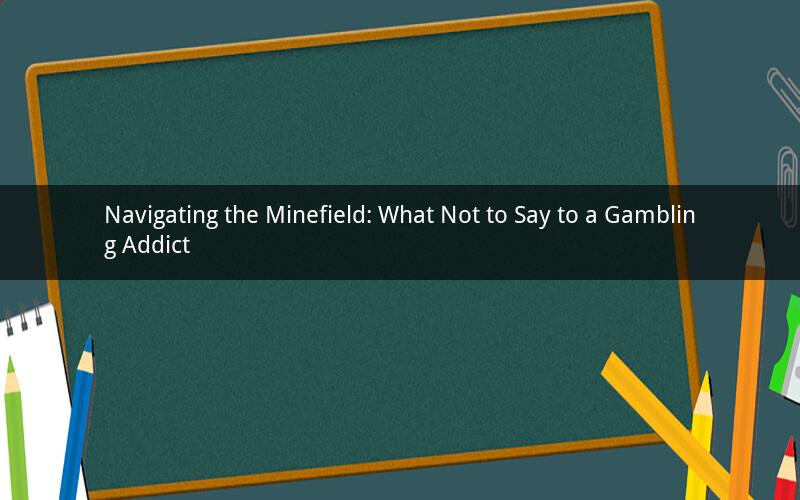
When dealing with a loved one who is struggling with a gambling addiction, it's crucial to understand what words can potentially worsen the situation. The path to recovery is already fraught with challenges, and certain phrases can inadvertently hinder the progress of an individual's journey. In this article, we will explore the pitfalls of communication and provide insight into what not to say to a gambling addict.
1. "Just Stop!"
One of the most harmful things you can say to a gambling addict is "Just stop!" This phrase implies that the individual has a lack of willpower or control, which is often not the case. Addiction is a complex disease that affects both the mind and body, and it requires a comprehensive approach to treatment and recovery. Instead of placing blame, try to offer empathy and support.
2. "You're Just Lazy"
Suggesting that a person's addiction is due to laziness or a lack of effort is not only insensitive but also counterproductive. Gambling addiction is a serious mental health issue, and labeling someone as lazy can exacerbate feelings of guilt and shame. Instead, focus on understanding the underlying factors contributing to their addiction and offer your support in addressing these issues.
3. "Why Can't You Be Like Everyone Else?"
Comparing a gambling addict to others can be damaging. Addiction is not a choice, and every individual's experience is unique. When someone is struggling with an addiction, they may already feel isolated and judged. Avoid making comparisons and instead try to connect with them on a personal level.
4. "You're Ruining Our Lives"
Accusing someone of ruining your life or the lives of others is a surefire way to create a defensive barrier. When a person feels attacked, they are less likely to open up and seek help. Instead, focus on expressing your concerns and emotions without placing blame. Encourage them to seek professional help, and remind them that recovery is a process that involves everyone in their support system.
5. "You're a Waste of Money"
Using derogatory language to describe a person's addiction is not only hurtful but also counterproductive. Labeling someone as a "waste of money" can deepen feelings of guilt and worthlessness, making it even more difficult for them to seek help. Instead, try to understand the reasons behind their addiction and offer support in finding healthier ways to cope with financial stress.
6. "I Can't Stand You Anymore"
When dealing with a loved one's addiction, it's natural to feel overwhelmed and frustrated. However, expressing your feelings of disgust or disdain can be detrimental to their recovery. Instead, communicate your emotions in a constructive manner, focusing on your own needs and seeking support from others.
7. "You're a Bad Person"
Labeling someone as a "bad person" due to their addiction is both unfair and unhelpful. Addiction is a disease, not a reflection of one's character. When someone is struggling with an addiction, they may already feel guilty and ashamed. Avoid perpetuating negative stereotypes and instead focus on their potential for change and recovery.
8. "I'm Not Responsible for Your Problems"
While it's important to take responsibility for your own feelings and actions, it's equally important to recognize that you cannot control someone else's addiction. Blaming yourself for their struggles can lead to feelings of guilt and helplessness. Instead, focus on finding ways to support your loved one and seek help for yourself, if needed.
9. "You Should Be Ashamed"
Shaming someone into recovery is unlikely to be effective. Addiction is a sensitive subject, and shaming can lead to increased feelings of guilt, shame, and isolation. Instead, encourage your loved one to seek help from professionals who can provide a safe and supportive environment for recovery.
10. "I Don't Care About You"
Expressing indifference towards a loved one can be incredibly damaging. Addiction can strain relationships, but it's crucial to maintain your connection with your loved one. Let them know that you care about their well-being and are willing to support them through their journey.
In conclusion, when dealing with a gambling addict, it's important to be mindful of the words you choose. Avoiding harmful phrases and instead offering empathy, support, and understanding can significantly improve the chances of a successful recovery. By navigating the minefield of communication with compassion, you can help your loved one find the strength to overcome their addiction.